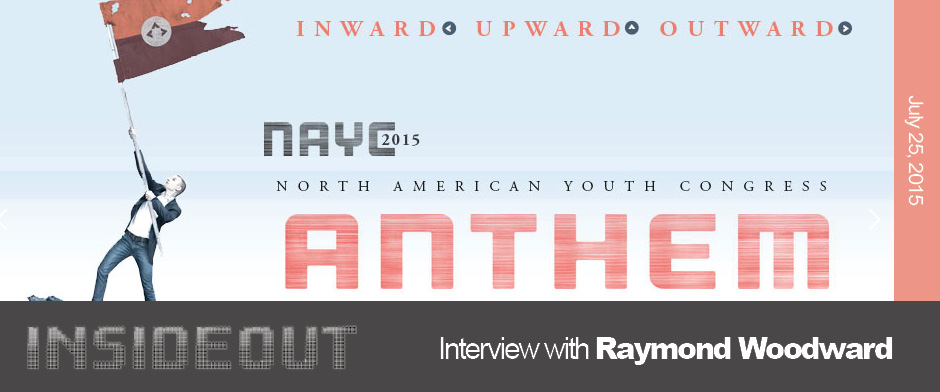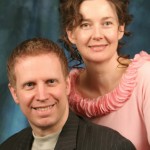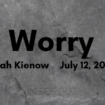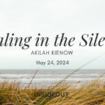Interview with NAYC Speakers: Raymond Woodward
 North American Youth Congress is almost here, and NAYC 15 is chock full of anointed speakers and musicians who will be ministering in Oklahoma City in just two short months. We’d like to you to get to know them before they preach to you and lead you in worship.
North American Youth Congress is almost here, and NAYC 15 is chock full of anointed speakers and musicians who will be ministering in Oklahoma City in just two short months. We’d like to you to get to know them before they preach to you and lead you in worship.
Our next interview comes from our Friday morning Hyphen split session speaker and pastor of Capital Community Church, Pastor Raymond Woodward.
InsideOut: If you were stranded on a deserted island, what three items would you want to have with you and why?
Raymond Woodward: I’m supposed to say Bible in here somewhere, right? So, here goes. A Bible, an Internet connection, and a BOAT! Hello! And, if I get to pick the island, let’s make it Prince Edward Island. That’s right next to New Brunswick so I won’t have to row so far. I could probably even walk across the ice in the winter. Oh, I just noticed the word “deserted.” My bad. In that case, I would trade the Internet connection for a cell phone with a REALLY good long distance plan. And why? You mean it’s not obvious?
InsideOut: Please tell us your favorite joke.
RW: So David Bernard, Jerry Jones, and Paul Mooney walk into a symposium. No really, I’m a horrible joke teller. My jokes put people to sleep worse than my sermons. And my inner sense of humor is sometimes so sarcastic that I could hurt somebody if I let it out. For example, I love this quote: “I’m allergic to stupidity. I break out in sarcasm.” Now that is funny to me. Sad, isn’t it?
IO: What is the funniest moment you have had while preaching?
RW: I get so focused when I’m preaching that I probably wouldn’t notice it. They would have to tell me later. But I do remember all the funny things that happen to other preachers. Like the time a visiting minister was preaching at Capital Community Church (CCC), and a guy delivered a pizza at the emergency exit right beside the platform and wouldn’t quit knocking until someone got up and opened the door.
But hey, while we’re picking on preachers, what about those media people? I know this is the texting generation, but the song “He’ll Do It Again” really does need some punctuation if you’re going to put it on the big screens.
IO: Why do you feel North American Youth Congress is so important for students to attend?
RW: There are few social forces stronger than peer pressure, especially during the teens and twenties. And nearly everywhere they go during those two decades, Apostolic youth are vastly outnumbered. High school, university, work, sometimes even at home. NAYC turns the tables on that peer pressure in a big way when over 18,000 of us get together to worship God. This is the largest gathering of Apostolic believers of any age, any place in North America. That’s why it’s an essential event for students—it lets them know for sure that they are not serving God alone, and that the church is much bigger than their local church. NAYC really helps to reverse the negative peer pressure of our culture.
IO: How do you mentally prepare to preach to thousands at Youth Congress?
RW: There’s definitely a huge sense of responsibility in preaching to that many people, but for me, there’s an even greater sense of responsibility in preaching to a group of that many young people. The potential for good and for God is both inspiring and intimidating, because this is the largest generation ever in North American history. We MUST hear from God, and not just hear from man. But the mental and spiritual preparation is essentially much the same as it is for any other sermon. I’ve heard it said this way: Study yourself FULL. Think yourself CLEAR. Pray yourself HOT. And let yourself GO.
IO: What do you feel are your top two personal strengths and weaknesses and why?
RW: I’ve always been very interested in Personality Theory, and one of the things I learned years ago is this: every strength has a corresponding weakness. You can’t have one without the other. In my case, I’m very focused and driven, and I like to end every day with my to-do list checked off. That’s a strength, but it comes with a weakness. I can get so focused and so driven that I can actually ignore people in the process of getting things done! I don’t mean to, but I do it. My friend, Pastor Jack Leaman, is the opposite (that’s why we make a good team). He has incredible people skills, but he can get so wrapped up in people that he forgets we’re trying to get a job done. We like to say that I am OCD, and he is ADHD.
Another strength I have is the ability to “take charge” and lead, to be decisive, and give direction. But again, that comes with a weakness. If I’m not careful, I can intimidate people and come across as bossy, intolerant, controlling, or even angry. Not good traits when you’re a pastor! So I’ve tried to surround myself with leaders who have strengths in areas where I am weak, and I’ve tried to watch and learn how they negotiate different situations and personalities. I’ve figured out I still have a long way to go!
IO: When and where did you receive your calling, and how did you prepare to fulfill it?
RW: I first felt a call to be involved in “ministry” during my teen years. However, I never thought “ministry” for me would involve a pulpit, and certainly not a profession. I just wanted to do everything I could do to help my pastor and our local church, but I look back now and see that God honored that desire to serve. Even in my teen years, I tried to be a “student” of Scripture—to figure the Bible out for myself and not just rely on being spoon-fed by sermons at church. God honored that desire to study.
After high school, I planned to get my degree in Education and become a teacher, but I never got to university. Instead, the Lord interrupted my plans and redirected me to Bible college at the last minute. I still remember telling God, “Okay, I’ll give up my dream of teaching and do whatever You want me to do.” Fast-forward thirty-five years, and the Lord has privileged me to “teach” in every region of the world. I was even able to go back to university and complete my Certificate in Adult Education. God gave back everything I “gave up,” and He gave me much more than I could have ever imagined, simply because I was willing to surrender my dreams to Him. I never even saw it coming—God is so amazing!
IO: What advice do you have for someone feeling a call to any aspect of ministry? What should their next steps be?
RW: It’s really important to remember that ministry is less about what you do, and more about who you are. So preparing for ministry is not about preparing for a vocation; it is about preparing to be a vessel that can be used by God. I get asked this question many times every year by young people, and my answer is always the same. Serve. Study. Submit. Don’t get “destination disease,” thinking you can only do something for God somewhere else. Get involved in your local church and serve your pastor. Next, you need to study. Devour the Bible, get a great education, read everything you can get your hands on, and pay close attention to the lives and ministries of people God is using.
Finally, you must learn to submit because submission is the number one test God uses to prepare you for ministry. Sub-mission is putting your mission under someone else’s mission. And by the way, you can only submit when you disagree with your leader and still obey them. God will test your submission, not just when you are young, but throughout your life because He can only use a vessel He can trust.
IO: What are your long term goals for ministry and life in general, and what steps do you plan to reach those goals?
RW: Words from Elder James Kilgore come to mind here. He said, “My theme to this generation has been: climb higher, dig deeper, reach further than ever before.” I would say it this way: I’m not sure I’ve got my life figured out in terms of “goals” (and certainly not ministry). The longer I live, the more I realize there are many things I’m not very good at. But I can climb higher, dig deeper, and reach further in those things God has allowed and anointed me to do. The name of the game—in life and in ministry—is focus. I want to do a few things that have an impact for the Kingdom rather than a lot of things that merely fill up the calendar. For me personally, it’s teaching, missions, and mentoring that God has repeatedly identified as “focus areas,” so I try to invest a lot of my time and energy in those things.
IO: How can the students take the North American Youth Congress fire to their homes and home churches and keep it burning?
RW: “Youth Congress fire.” Hmm. Is this a Jimmy Toney sermon illustration involving pyrotechnics, by any chance? (See, that is why I don’t tell jokes.) I think two things are very important in maintaining spiritual momentum from an event like NAYC. The first thing is relationship. Keep in constant contact with other young people who are going the same direction spiritually. And there’s no better place to start than with the people who are attending NAYC with you! The second thing is discipleship because while you can’t maintain the emotion of the arena, you can maintain the devotion of the altar. People forget that “disciple” and “discipline” come from the same root word. Personal prayer and Bible reading really are the daily “workout” that will keep you strong and on fire for God.
Raymond Woodward returned to his hometown of Fredericton to become the lead pastor of Capital Community Church on Pentecost Sunday in June 2001. Prior to that, he served as an assistant pastor for nearly twenty years. He and Beverley were married in 1983 and have two adult children, Emily (married to Ryan) and Matthew (married to Katricia).









